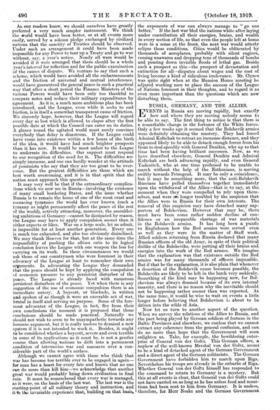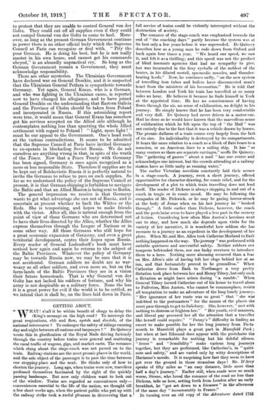RUSSIA, GERMANY, AND THE ALLIES.
EVENTS in Russia are moving rapidly, but exactly how and where they are moving nobody seems to be able to say. The first thing to notice is that there is a remarkable change in the fortunes of the White forces. Only a few weeks ago it seemed that the Bolshevik armies were definitely obtaining the mastery. They had forced Admiral Koltchak to retreat an immense distance, and they appeared likely to be able to detach enough forces from his front to deal speedily with General Denikin, who up to that time had been having brilliant successes. Now, as we have described elsewhere, General Denikin and Admiral Koltchak are both advancing rapidly, and even General Yudenitch, who at one time professed to be unable to march without the help of the Esthonians, is moving swiftly towards Petrograd. It may be only a coincidence, but it may be something more, that the anti-Bolshevik Russians have pulled themselves together immediately upon the withdrawal of the Allies—that is to say, at the moment when they were compelled to rely upon themselves, and were no longer troubled by the suspicion that the Allies were in Russia for their own interests. The removal of this suspicion may have detached many supporters of Bolshevism. However that may be, there must have been some rather sudden decline of confidence or an irreparable shortage of war materials in the Bolshevik armies. It has long been a puzzle to Englishmen how the Red armies were served even as well as they were in the matter of Staff work. Allied soldiers returning from Russia declared that many Russian officers of the old Army, in spite of their political dislike of the Bolsheviks, were putting all their brains and energies into the work of the Red armies. We imagine that the explanation was that existence outside the Red armies was for many thousands of officers impossible. But if that be the explanation, it is also plain that whenever a desertion of the Bolshevik cause becomes possible, the Bolsheviks are likely to be left in the lurch very suddenly. Something of the kind may be happening now, for Bolshevism was always doomed because of its own internal insanity, and there is no reason why the inevitable should not be happening rather sooner than was expected. At the same time, it would be wise to wait on events a little longer before believing that Bolshevism is about to be driven into the wilds of Asia.
Now let us turn to another aspect of the question. When we survey the relations of the Allies to Russia, and the part being played by German soldiers of fortune in the Baltic Provinces and elsewhere, we confess that we cannot extract any coherence from the general confusion, and can do no more than hope that the Government will soon enlighten us. Take, for example, the bewildering enterprise of General von der Goltz. This German officer, a nephew of the well-known Marshal von der Goltz, seems to be a kind of detached agent of the German Government and a direct agent of the German militarists. The German Government have forbidden him to march upon Riga. Nevertheless his troops are already in the suburbs of Riga. Whether General von der Goltz himself has responded. to the command to return to Germany is a mystery. But this at all events is clear, that General von der Goltz could not have carried on as long as he has unless food and munitions had been sent to him from Germany. It is useless, therefore, for Herr Noske and the German Government to protest that they are unable to control General von der Goltz. They could cut off all supplies even if they could not compel General von der Goltz to come to heel. Moreover, so long as the present German Government continue in power there is no other official body which the Supreme Council at Paris can recognize or deal with. " Pity the poor German. He is doing his best, but he is not really master in his own house, and cannot get his commands obeyed," is an absurdly unpractical cry. So long as the German Government remain a Government, they must acknowledge responsibility. There are other mysteries. The Ukrainian Government have declared war on General Denikin, and it is suspected that the Ukrainian General Petlura is sympathetic towards Germany. Yet again, General Kraus, who is a German, and who was fighting in the Ukrainian cause, is reported now to have changed his allegiance, and to have joined General Denikin on the understanding that Eastern Galicia and the Province of Cholm should be taken from Poland and incorporated in Russia. If this astonishing report were true, it would mean that General Kraus has somehow got his services accepted on the Allied side although he contemplates nothing less than upsetting the whole Allied settlement with regard to Poland ! " Light, more light ! " must be our appeal to the Government. One's head reels at the various contradictions. It seems to be admitted that the Supreme Council at Paris have invited Germany to co-operate in blockading Soviet Russia. We do not ourselves see anything wrong in that, in spite of the wrath of the Times. Now that a Peace Treaty with Germany has been signed, Germany is once again recognized as a more or less responsible State. Therefore if supplies are to be kept out of Bolshevistic Russia it is perfectly natural to invite the Germans to refuse to pass on such supplies. So far as we understand the policy of the Supreme Council at present, it is that German shipping is forbidden to navigate the Baltic and that an Allied Mission is being sent to Berlin.
The general impression we receive is that Germany wants to get what advantage she can out of Russia, and is uncertain at present whether to back the Whites or the Reds. She is temporizing, and hopes to make friends with the victor. After all, this is natural enough from the point of view of those Germans who are determined not to have their lives directed by the Allies, whether the Allies express themselves through the League of Nations or in some other way. All those Germans who still hope for a great economic expansion of Germany, and even a great territorial development, centre their hopes upon Russia. Every reader of General Ludendorff's book must have noticed how again and again he returns to the subject of the Baltic Provinces. Whatever the policy of Germany may be towards Russia now, we may be sure that it is not accidental. German soldiers no doubt are as warweary as all other soldiers, and even more so, but on the farm-lands of the Baltic Provinces they see in a vision their future homesteads. That is why General von der Goltz has not lacked his soldiers of fortune, and why his army is not despicable as a military force. None the less it is a great power for evil if the world is to be settled, as we intend that it shall be, on the lines laid down in Paris.







































 Previous page
Previous page